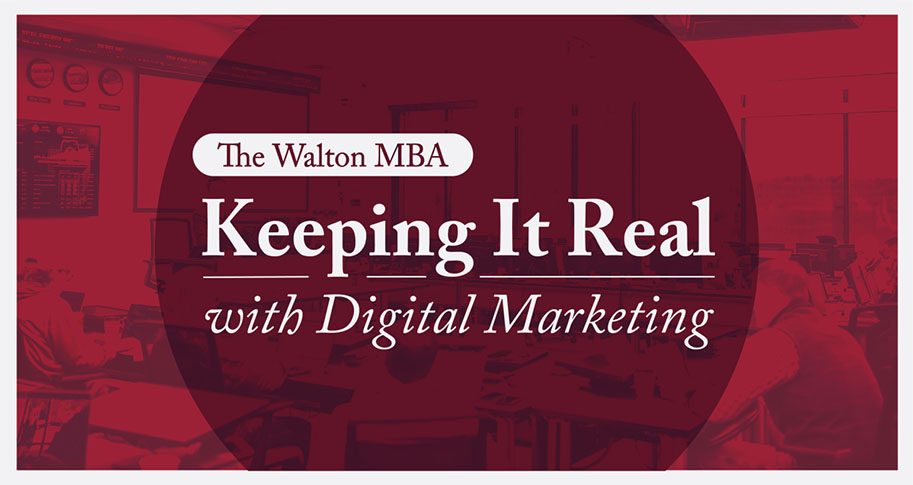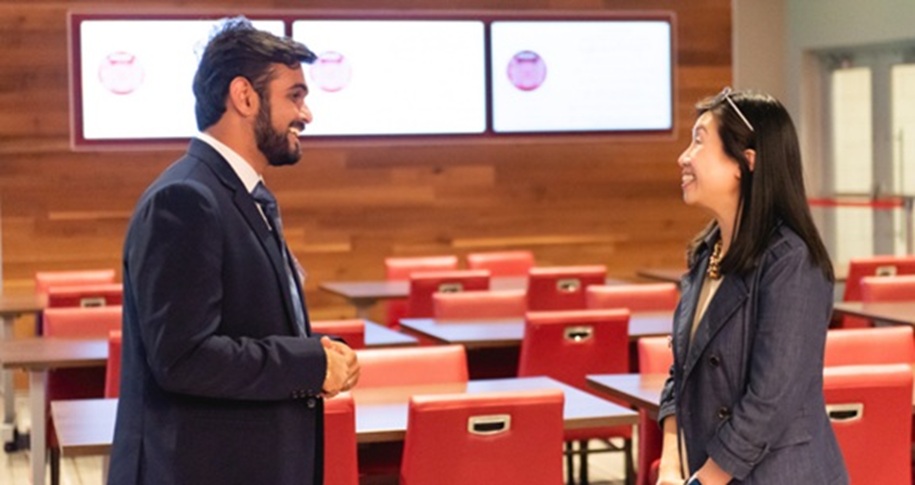
SEO. Influencers. Automation. PPC. All topics at the cutting-edge of marketing practice today. They’re also, as it happens, topics we’re discussing in the full-time Walton MBA program this semester.
MBA students at the University of Arkansas are completing a full course in digital marketing—the ideas, practices, and tools used by today’s marketers to effectively
promote brands and products online.
It’s my honor to facilitate the course, and it’s already shaping up to be the experience of a lifetime.
A Marketing Course for the Digital Age

Believe me, today’s marketers are up to their necks in “the digital.” Marketing in the 21st century is a fast-paced, sometimes dizzying world of search engines, social platforms, digital ads, email services, real-time analytics, and lots more. Is it just me or is the room spinning?
The next generation of business leaders must be prepared for this new reality and empowered to think strategically about marketing in the digital age.
To this end, the Walton MBA’s newest course is designed to equip students with “marketing street knowledge”—awareness of the tools, tactics, and strategies used by marketers in 2021. As an MBA course, a particular focus is preparing students to lead modern marketing organizations.
“I am gaining a holistic understanding of the history of marketing best practices which helps me to think critically about where we are heading,” said John Taylor, a second-year MBA student enrolled in the course. “Because of this class I am confident I will be able to contribute to any conversation around digital marketing moving forward in my career.”
Admittedly, I’m a bit of a marketing nerd, but I for one think we’ll be diving into an exciting range of topics this semester:
- Consumers in the digital age
- The evolution of marketing up to present day
- Prevalent marketing philosophies and frameworks (e.g., inbound marketing)
- Content creation and distribution (e.g., social media marketing, SEO)
- Digital marketing tools, platforms, and channels
- Marketing analytics
- Perspectives on leading modern marketing organizations
Along the way, we’ll discuss everything from search ads to attribution models, case studies to live video.
You know, the stuff of everyday marketing.
Stuff that has become even more relevant and prevalent over the past year. COVID, after all, has intensified the need for a course like this. A tectonic shift toward the digital has been occurring for years, but the pandemic is making digital marketing—and digital marketing education—more essential than ever.
“This course could not have come at a better time,” said second-year MBA student MaryJohn Richmond. “COVID has expedited the need for companies to move their business more online, which inherently means reallocating marketing dollars to digital activities.”
Pre-COVID. Post-COVID. It’s a digital world, and students must make-ready for it.
But how exactly did we get here, offering an MBA class specifically about digital marketing?
Mr. Theory, Meet Ms. Practice
There’s a memorable scene in the hit movie Interstellar. Dr. Brand, played by Anne Hathaway, has just made it back to the ship following a cataclysmic visit to another planet.
Clearly traumatized, Brand says to her shipmate, “I thought I was prepared. I knew the theory.” She pauses, then whispers…
“Reality’s different.”
From time to time, I’ve seen Brand’s distress in the faces of my students. They’ve spent years learning marketing theory, only to find “reality’s different.”
If I may channel my inner-movie critic for a moment and interpret the scene from Interstellar. It’s not that Brand was wrong for studying theory. The theory was absolutely, positively critical.
It’s that she didn’t have a chance to apply the theory until the stakes were too high and the circumstances too daunting. Many-a-recent marketing grad can probably relate.
I’ve noticed—you probably have, too—a couple of competing views about marketing education:
1. “Marketing courses should emphasize theory.”
By theory I mean general explanations about the way marketing works that often stop short of explaining how to actually do it. Tip of the hat to the marketing mix and purchase decision process.
This view, in my experience, is more often implied than stated. It’s been implied by marketing textbooks, lectures, and research for decades.
2. “Marketing courses should emphasize practice.”
Conversely, this view is often stated outright. Many believe marketing courses today should teach more than theory. They should teach how to do it. Essentially, trade more than theory. “Hello students, today I’ll show you how to run a Facebook ad.”
Which view is right? In my opinion, they both are. Of course, I’d also argue they’re both wrong. They’re both wrong because they’re both incomplete.
Especially today, marketing theory and practice need one another—I mean, in a desperate, lovesick, “Jerry Maguire” kind of way.
Mr. Theory: “You complete me.”
Ms. Practice: “Just shut up. You had me at hello.”

There’s good reason Kurt Lewin famously said, “Nothing is as practical as good theory.” Sound thinking is practical, and, to this end, I’m relieved marketing students still get heavy doses of theory.
I tell my classes regularly, “As a practicing marketer, give me someone who can think like an effective marketer, and I can teach them to do marketing readily enough. But, give me someone who doesn’t have a solid grasp of marketing principles, and, well, Sorry Charley.”
It’s true: Today, tomorrow, and always, marketing programs should emphasize theory—so students think effectively as marketers. But, marketing education should also emphasize “the practical.”
For today’s marketers, who might be working on lead flows one minute and live video the next, theory often feels too nebulous to apply-on-the-fly.
But what if we in higher ed bridged the gap between marketing theory and marketing practice? After all, that first step can be a real doozy.
I’m excited to say that’s exactly what’s happening at the Sam M. Walton College of Business today. I’m even more excited to be part of it, something that feels like it’s been in the works for years.
The Walton College Plays Matchmaker
After teaching marketing for a decade, I decided it was time to see marketing in the wild—to actually work in the field. Gulp.
I knew I’d enjoy it, but my future students were the primary motivation. I wanted to share with them perspectives, practices, and anecdotes from “the trenches” of real-world marketing.
A wonderful Fayetteville-based company, Field Agent, took a chance on me. The company was growing and ready to pour fuel on the fire by building a dedicated marketing program. For six years I got to fail, learn, and grow as a marketing practitioner. Quite the education.
More recently, I’ve served as the vice president of marketing for Modthink, a Fayetteville-based marketing agency specializing in thought leadership marketing for universities and B2B businesses. Thank you, Modthink, for showing me marketing from an agile, agency perspective.
These experiences have provided all kinds of fodder for class discussions and assignments. More importantly, they’ve given me an appreciation for the tools, tactics, and trends that define the modern marketing arena.
A couple of years ago, I began talking with Dr. Ronn Smith, former chair of the Walton College’s marketing department, about developing an undergrad course specifically in digital marketing. I’m grateful to my friend and mentor Henry Ho, co-founder of Field Agent, for encouraging me down this path.
After teaching the course for three semesters at the undergraduate level, Dr. Vikas Anand, executive director of the college’s MBA program, asked me to design and teach a course on digital marketing for full-time MBA students. As with the undergraduate course, the MBA class examines the many facets of contemporary, digital marketing, but at a higher conceptual level—more leadership, marketing philosophy, and historical perspective.
It’s been a blast. Walton MBA students are a notch above, and I’m learning so much from them. With each class, these up-and-coming business leaders become a little more acquainted with the practices and principles characteristic of today’s marketing profession.
And that’s what we urgently need today, especially in the marketing field: cross-pollination between industry and academy.

The newest Walton MBA course is a major step in this direction.
Theory and practice complete one another; they’re made for each other. So, the Walton College is ensuring the two have plenty of chances to meet.
How’s that for matchmaking?





